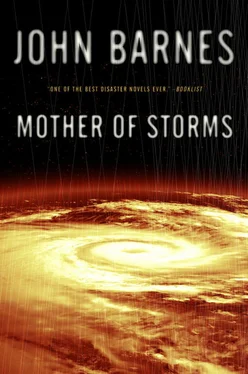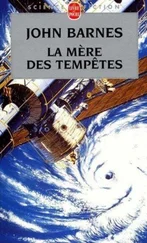What they are is copies of the wiseguys. The simplified Louies back in the asteroid belt have copied themselves onto bigger and better processors, taken data from him to merge into these augmented versions of themselves, and fired them off to join him. As they arrive—all within a few hours of each other—he incorporates them, and suddenly he remembers, seventy times, meeting some dim, dark body in the cold of space, spreading over its face and burrowing into its core (or cores, more often it was several bodies spinning around each other), and becoming a factory and forge in space.
The wiseguys daydreamed a lot, and Louie-on-the-moon has been tutoring them as well, without ever exactly having discussed it with Louie-the-ship. He doesn’t feel offended; on the contrary, the reunion is wonderful, and everyone enjoys probing everyone else’s memories; it’s quite a party, lasting almost twenty-four hours, carrying him/them two full AU beyond Neptune’s orbit before they get around to discussing, or he gets around to thinking about, depending on how many Louies he is right now, what to do with the solar system once this local emergency on the third planet is dealt with.
It’s really only in the last hour of the reunion that thought drifts back from conversation to monologue. Louie feels unified again, but lonely.
He’s had to further distribute himself across more processors in a longer train, and it’s now almost ten light-seconds from one end to the other of him; it feels different, a little, but more like having a richer subconscious and deeper emotions than a limitation. He wonders what it would be like to be distributed clear across the solar system. If he created linking processor stations in solar orbits, a few light-seconds apart all the way from inside Mercury’s orbit to outside Neptune’s….
Well, no doubt he will find out someday. He’ll need a lot of processors anyway, to control the network of boosting stations he’s already planning… thousands of Louies, all at the “train stations to space”—fun to think about the chess league and debate clubs they could have. It does get kind of lonely out here.
It’s an aphorism in statistics that to set an all-time record one must be exceptional, but one must also be in the right place at the right time. Franklin Roosevelt was a brilliant campaigner but he faced only one first-rate opponent. Joe Louis and Muhammad Ali were great fighters but they fought a lot of bums. Babe Ruth was a great hitter but he had a more elastic ball, shorter outfield fences, and worse pitching to contend with; Hank Aaron had expansion clubs to bat against.
Thus the champion taker of human life, Clem 650, is one of the biggest daughters, but it’s also in the right place at the right time. There was never any hope of evacuating Japan, and even with replicating machinery the Japanese did not have time to get big enough seawalls into place. Clem 650 loops to the north and east of Honshu, and storms down through a dense corridor of human beings for whom nothing can be done. All by itself, it takes half a billion lives in nine days.
On August 26, it comes ashore near Yokohama, and the next day, though the Japanese are refusing to answer questions, radar shows no buildings standing in Tokyo.
Clem 650 tears south, flinging the Inner Sea far inland on Honshu and Kyushu, sending a funneled storm surge over to batter the coast of China, and down into the Formosa Strait.
The storm surge that piles up into the Formosa Strait, between the island of Formosa and the mainland, is funneled and channeled into a stream strong enough to slice off the port cities from Quanzhou to Zhanjiang—including Hong Kong and Macau—like water from a fire hose cutting into a snowbank. The video out of China is hideous—mobs of people climbing over collapsed piles of bodies in the streets, desperately trying to get out of the low coastal cities.
Later, when Clem 650’s remnants drift across China, leaving tornadoes and thunderstorms in their wake, the storms catch millions of refugees in the open. On September 4, Clem 650 heads inland for the last time, eventually to fling a great load of wet warm air up the side of the Tibetan Plateau, whence it will return as severe flooding on the Mekong, Red, and Hongshui.
With record-keeping in collapse, the Army broken down to small units, and millions of people no longer traceable, the central government of China begins to lose its grip south and east of the Yuan River; within a week, various Army commanders have set themselves up as warlords in all but name, an impossible-for-outsiders-to-understand multisided civil war is breaking out, and several tactical nukes have been fired. If you count disease, flood, and war victims, Clem 650 claims nearer a billion than a half billion victims.
When Louie Tynan is a day beyond Neptune, he begins to reverse the flow of the train. He’s at 36 Au, clipping along at almost five AU per day—fast enough to get from the sun to the Earth in a long afternoon, fast enough to cover the distance from Earth to Jupiter, which took the early probes years and even the Good Luck a month, in a single day. It’s time to start slowing down.
By now he no longer needs processing units or any other working component, just mass and momentum, so what arrives from the wiseguys now is just big slabs of iron. To slow down as they overtake him, he accelerates the iron bars through the train, adding momentum to them as they shoot through the funnels. Momentum is conserved—so as the iron bars are sped up and hurled out of the solar system, fast enough to reach Alpha Centauri in a bare 14,000 years, had they been headed that way, the momentum they carry away with them is lost to the ship, and Good Luck begins to slow down.
It will take a week at 2 g’s to slow down for the rendezvous with 2026RU; in that time the ship will climb clear out to 56 AU from the sun, almost doubling the distance already covered but doing it in less than one-fifth the time. It’s going to be a great ride, and it’s a good thing that he doesn’t care much anymore about being the fastest man alive, because though he’s certainly fast, he isn’t alive. Not exactly.
Out here, radio from Earth is reaching him four hours after it’s sent, which means that a response from Carla is always to something he said eight hours ago, and his brain has become so massively parallel that this corresponds, if it were a single human brain thinking as fast as it could, to 5,021 years of ordinary mental life.
Not that he’d actually choose to experience it that way. He’s more like two hundred people having twenty-five and a little extra years of telepathic mental life.
He tries hard to comprehend what happened with Clem 650, but it eludes him. He says, Each of them was as individual as I, as Carla, as my parents, as anyone I know ; there were poets and mechanics, doctors and bums, drunks and lovers and saints and everything. Children died screaming for their parents, parents for their children, some in silence, some after long hours, some instantly. So many bodies… they will be finding deposits of them on the South China Sea floor a thousand years from now.
His mind stretches that far, but it hurts, and there is work to do.
By now, if he were still seeing with naked human eyes, he would see the sun as a very bright star, with no discernible disk; but Louie sees the whole electromagnetic spectrum through array receptors scattered along the two-million-mile train of the Good Luck plus packages and auxiliaries. He can still see individual asteroids, and for that matter he can make out the continents of Earth, and Clem itself, if he wants to. There’s just not much reason to look that way.
He figured when he got out here that his old nature would assert itself and he’d at least think a little wistfully about just taking off for the stars, even though he would never leave Earth in the lurch that way. Maybe the optimization has done something to him?
Читать дальше












